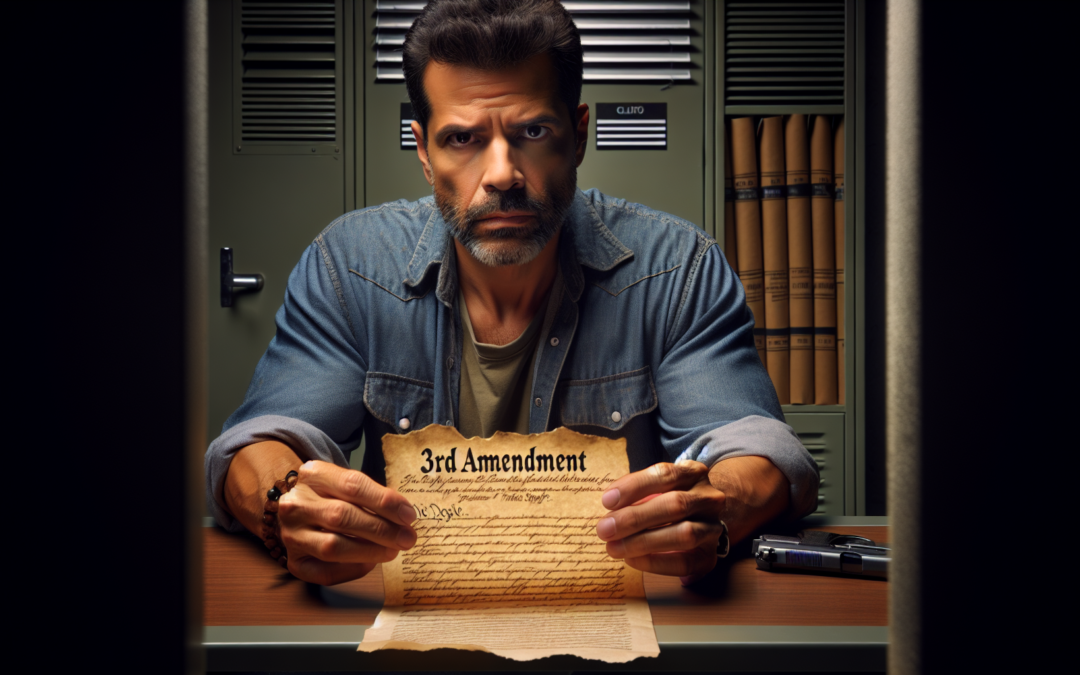The Fine Line: Upholding Law Amid Misunderstandings
In the day-to-day life of a law enforcement officer, strategic presence and quick thinking are crucial elements. Officers are clad not only in uniforms but in a stoic resolve and motivated by a fundamental choice to serve communities that rely on them for peace and protection. Yet, beneath their stern demeanor lies the humanity of individuals often challenged by misconceptions around the very laws they swore to protect.
One might think that knowledge of the Constitution, the foundational blueprint of American governance, is a common understanding among citizens. In reality, officers regularly face the inevitable chasm where individual interpretations clash loudly with established law. In one incident amusingly dissected by John Ligato, a familiar face to law enforcement cited the 3rd Amendment—a constitutional relic from the Revolutionary era, concerning quartering of soldiers—as a basis to rightfully remain silent. Watch the episode here.
This imaginative stance not only reflects a unique viewpoint but crystallizes a broader issue—the abyss of legal misunderstanding. For officers, navigating these waters requires patience, communication, and empathy. Behind each badge is an intrinsic commitment to education and mediation, balancing legal enforcement with the public’s comprehension of their own rights.
Painting a Broader Picture
The frequent flyer at the heart of this story, with his 40 bouts with the law, provides a narrow glimpse into what remains a significant challenge: addressing legal illiteracy. The irony lies in the perceived pastiche he creates—a quixotic tale of defending self-assigned rights—whilst in reality, constituting a sincere test of patience for those tasked with his rehabilitation.
Faced with such situations, it becomes paramount for officers to hold onto their moral compass, fostering dialogues alongside duties of compliance and enforcement. The laughing anecdote from Ligato’s analysis shades a picture that runs deeper than humor—it steals into the social construct that public servants attempt to leverage even out of the most unconventional civic lessons.
Law enforcement officers often transform into reluctant educators. Where social systems sometimes falter, they pick up the slack by embodying laws laid down decades, even centuries ago. Each encounter is noted for records, but more importantly, considered part of an accumulated narrative—an unending story of societal learning curves.
John Ligato’s witty airing accentuates the roots of legal protocol while pondering these situations athletically as touchpoints of political satire, tendering a palpable invitation to redefine understandings. Follow more insights on his channel.
Personal Courage in the Face of Adversity
One must not overlook the indomitable spirit owning the badge. Against what may seem as repetitive comedy, these officers operate on high alert—reciting officer matins of calmness in the face of absurd assertions. Experiences like these are sewn into their professional fabric, yet they reinforce the lesson of acumen presented with sophistication.
For the constitutional scholars within, such moments are more than just media fodders—they prove an examination of the same democratic privileges juried to assure. If evaluated with judicious goggles, they become emblematic of the potential latent among contemporary society; the prospect of holding a civil dialogue stimulated by misunderstandings.
A Call to Engage
John Ligato’s portrayal thus stands as more than merely a prism of entertainment. It becomes instrumental towards broader societal introspection on how narratives of law and community dissect truth from fantasy. Law enforcement becomes a plane navigating this immediacy—with each shift they underlie constructive bonds comprising every stakeholder in the geopolitical braided web.
Thus, when stepping back from the humor, listeners and viewers of Ligato’s journey are implored to engage empathetically, understanding the nuanced song and dance between laws ostensibly engraved in stone tablets and their practical appliqué. Join his discussions on Facebook.
Collaboration and Education
Moreover, crafting resolutions from disarray points to another pillar of law enforcement: the social responsibility to educate. Dioscedro narratives aside, they call for systemic reform, where focused schooling and outreach can prevent faulty invocations from escalating.
Collaborative modules engaged under community policing efforts foster dialogue, engaging social quarters to plant seeds of interpretation—truer seeds aligned with the epic lexis of Divine County’s Order. Through structured channels, partnered with educational allies, authorities advocate ascertainable truths as gold standards for law-abiding commitment.
“As we combat misinformation,” John Ligato’s voice echoes, showing, indeed, grand truths can spring from humor and misunderstanding, rifling to inspect defense aseze races together modern Constitutions from today’s Civil braid. Thus spoke the vigilant soul dressed in blue, unearthing mirrored truths melded ancient pretenses molded across towns, hillocks, townsfolk ready for edification by ligature bridging force-love tales tested time.

Recent Comments